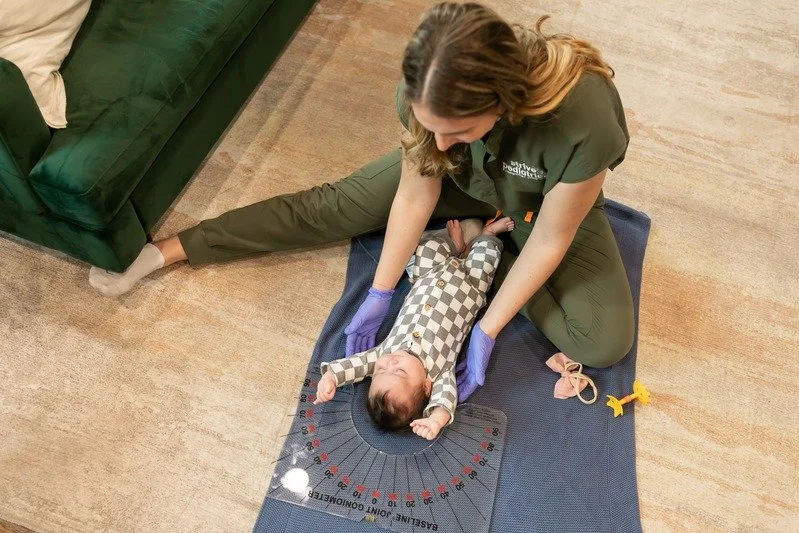Understanding Primary Reflexes: How They Shape Development and Impact Growth
6 min read
Primary reflexes are automatic responses present from birth that help babies survive, adapt, and develop essential skills. While these responses are natural, factors like stress or environment can influence their development, sometimes leading to feeding or motor challenges that may require intervention.
What’s Really in Your Baby’s Formula? A Feeding Therapist Explains
2 min read
Ever looked at a baby formula label and felt like you needed a chemistry degree to understand it? From “corn syrup solids” to “hydrolyzed whey,” those complex names each serve a purpose. This guide breaks down what key ingredients like lactose, casein, and amino acids actually do — and how they impact your baby’s digestion and comfort. Understanding what’s inside the can helps you choose the best formula for your little one’s unique needs.
Constipation, Potty Training, and the Nervous System: What Every Parent Should Know
3 min read
Is your child resisting the toilet no matter what you try? Potty struggles aren’t always behavioral—they often involve muscles, nerves, and body awareness. From pelvic floor tension to sensory sensitivities, occupational therapy can help your child recognize body cues, relax, and gain confidence, turning toilet battles into potty victories.
Colic, Reflux, and Crying Babies: Why It’s Not Just “Normal”
3 min read
If your baby cries, arches, or spits up frequently, it’s not just a phase—it’s communication. Colic and reflux often signal underlying issues like swallowing excess air, overfeeding, oral motor dysfunction, food sensitivities, or body tension. By identifying the root cause, parents and therapists can support feeding, digestion, and comfort, helping babies thrive and families feel confident.
Understanding Infant Formulas: Finding the Right Fit for Your Baby’s Tummy
2 min read
Choosing the right formula can feel like a guessing game—especially when your baby is fussy, gassy, or showing signs of tummy trouble. From standard to amino acid-based formulas, each type supports different digestive needs. This guide breaks down what each category means, what signs to watch for, and how to find the formula that helps your baby feel calm, comfortable, and thrive.
The Importance of Pre- and Post-Release Therapy for Babies with Tongue Ties
5 min read
If your baby has a tongue tie, therapy before and after a frenectomy is essential. Pre- and post-release therapy supports oral function, healing, and overall development, ensuring the best outcomes for your child.
Why the "Wait and See" Approach to Head Flattening Is Not Ideal: Early Intervention for Optimal Neurodevelopment
4 min read
Head flattening in babies is more than a cosmetic concern. While some suggest a “wait and see” approach, research shows that early intervention can improve head shape and support crucial neurodevelopment during your baby’s first months. Being proactive during this time can make a significant difference during a critical growth period.
Understanding Infant Oral Motor Reflexes: Key to Early Development and Feeding
5 min read
During your baby’s first months, oral motor reflexes play a key role in feeding and development. Reflexes like rooting, tongue thrust, and the phasic bite help babies latch, swallow, and prepare for solid foods. This blog walks you through understanding these reflexes and when to seek outside intervention.
Why is My Baby Not Taking a Bottle? Common Causes and Solutions
5 min read
Many parents worry when their baby refuses to take a bottle. Transitioning from breastfeeding or introducing formula can be tricky, as babies need to learn new feeding skills using different facial muscles. We are here to help understand what the difference is, what can cause difficulties, and when to see an expert.
Pacifier Pros and Cons: Impact on your Baby’s Development and Tips for Weaning
5 min read
“Pacifier: Yes or No?” Many parents wonder if pacifiers are helpful or harmful in the long-term. While they can help soothe fussy babies, it is important to find a balanced approach. This guide explores the pros, cons, and offers expert tips for safe pacifier use and weaning.
The Role of Occupational Therapy in Breastfeeding: Supporting Mother and Infant
4 min read
Occupational therapy can play an important role in breastfeeding by supporting both mom and baby. By treating breastfeeding as a shared activity, or “co-occupation,” OTs help improve the baby’s comfort, efficiency, and bonding between the mother and infant—making the experience more positive for the whole family.
How to Transition from Breastfeeding to Bottle Feeding and When to Introduce a Bottle
4 min read
Transitioning from breastfeeding to bottle feeding can feel overwhelming, but with the right approach, it can be a smooth process for both you and your baby. Knowing when to introduce the bottle and how to ease the transition can make the process less stressful. Here’s a comprehensive guide to help you navigate this important step, with expert tips to make bottle feeding a successful experience.
Torticollis in Babies: Signs, Treatment, and Why Early Therapy Matters
4 min read
If you’ve noticed that your baby prefers to turn their head to one side or has trouble looking both ways, they may have torticollis—a common condition affecting neck movement in infants. Without treatment, torticollis can lead to head flattening (plagiocephaly), delayed milestones, and postural imbalances. The good news? Early intervention with pediatric physical therapy can resolve torticollis and prevent long-term complications.
How the Right Bottle Nipple Supports Your Baby’s Development
5 min read
Choosing the right baby bottle is more than just convenience—it can impact your little one’s feeding skills and oral development. At Strive Pediatrics, we guide parents through the details that matter, from nipple shape to flow rate, helping support healthy sucking, swallowing, and breathing coordination from the very start.














